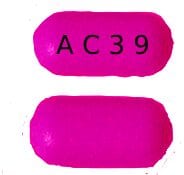Uses
Erythromycin is used to treat certain infections caused by bacteria, such as infections of the respiratory tract, including bronchitis, pneumonia, Legionnaires’ disease (a type of lung infection), and pertussis (whooping cough; a serious infection that can cause severe coughing); diphtheria (serious infection in the throat); sexually transmitted diseases (STD), including syphilis; and ear, intestine, gynecological, urinary tract, and skin infections. It also is used to prevent recurrent rheumatic fever. Erythromycin is in a class of medications called macrolide antibiotics. It works by stopping the growth of bacteria.
Antibiotics such as erythromycin will not work for colds, flu, or other viral infections. Taking antibiotics when they are not needed increases your risk of getting an infection later that resists antibiotic treatment.
Side Effects Of Erythromycin
Erythromycin may cause side effects. Tell your doctor if any of these symptoms are severe or do not go away:
- upset stomach
- diarrhea
- vomiting
- stomach pain
- loss of appetite
Some side effects can be serious. If you experience any of the following symptoms, call your doctor immediately or get emergency medical treatment:
- rash
- itching
- hives
- difficulty breathing or swallowing
- wheezing
- yellowing of the skin or eyes
- dark urine
- pale stools
- unusual tiredness
- pain in the upper right part of the stomach
- seizures
- fast, pounding, or irregular heartbeat
severe diarrhea (watery or bloody stools) that may occur with or without fever and stomach cramps (may occur up to 2 months or more after your treatment)
Warnings & Precautions
Before taking erythromycin:
- tell your doctor and pharmacist if you are allergic to erythromycin, any other medications, or any of the ingredients in erythromycin capsules, tablets, or suspension. Ask your pharmacist or check the manufacturer’s patient information for a list of the ingredients.
- tell your doctor if you are taking astemizole (Hismanal) (not available in the U.S.), cisapride (Propulsid) (not available in the U.S.), dihydroergotamine (DHE 45, Migranal), ergotamine (Ergomar, in Cafergot, in Migergot), pimozide (Orap), or terfenadine (Seldane) (not available in the U.S.). Your doctor will probably tell you not to take erythromycin if you are taking one or more of these medications.
- tell your doctor and pharmacist what prescription and nonprescription medications, nutritional supplements, and herbal products you are taking or plan to take. Be sure to mention any of the following: alprazolam (Xanax), amlodipine (Norvasc, in Caduet, in Lotrel), anticoagulants (‘blood thinners’) such as warfarin (Coumadin, Jantoven), bromocriptine (Cycloset), carbamazepine (Carbatrol, Epitol, Equetro, Tegretol), cilostazol (Pletal), colchicine (Colcrys, Mitigare), cyclosporine (Neoral, Sandimmune), digoxin (Lanoxin), diltiazem (Cardizem, Cartia, Diltzac, Tiazac), disopyramide (Norpace), dofetilide (Tikosyn), lovastatin (Altoprev), midazolam, phenytoin (Dilantin, Phenytek), procainamide (Procanbid), quinidine, sildenafil (Revatio, Viagra), simvastatin (Zocor, in Vytorin), sotalol (Betapace), valproic acid (Depakene, Depakote), verapamil (Calan, Covera, in Tarka, Verelan). theophylline (Elixophyllin, Theochron, Theo-Dur), and triazolam (Halcion). Many other medications may also interact with erythromycin, so tell your doctor about all the medications you are taking, even those that do not appear on this list. Your doctor may need to change the doses of your medications or monitor you carefully for side effects.
- tell your doctor if you have or have ever had prolonged QT interval (a rare heart problem that may cause fainting or irregular heartbeat), an irregular heartbeat, low levels of magnesium or potassium in your blood, or liver disease.
- tell your doctor if you are pregnant, plan to become pregnant, or are breastfeeding. If you become pregnant while taking erythromycin, call your doctor.
- if you are having surgery, including dental surgery, tell the doctor or dentist that you are taking erythromycin.
Erythromycin Dosage
Erythromycin comes as a capsule, tablet, delayed-release (releases the medication in the intestine to prevent break-down of the medication by stomach acids) capsule, delayed-release tablet, and an oral suspension (liquid) to take by mouth. It usually is taken with or without food every 6 hours (four times a day), every 8 hours (three times a day), or every 12 hours (twice a day). Follow the directions on your prescription label carefully, and ask your doctor or pharmacist to explain any part you do not understand. Take erythromycin exactly as directed. Do not take more or less of it or take it more often than prescribed by your doctor.
Shake the suspension well before each use to mix the medication evenly.
If you are taking the suspension, do not use a household spoon to measure your dose. Use the measuring spoon, dropper, or cup that came with the medication or use a spoon made especially for measuring medication.
Swallow the capsules and tablets whole with a full glass of water; do not chew or crush them.
Continue to take erythromycin even if you feel well. Do not stop taking erythromycin without talking to your doctor.
Other
Keep all appointments with your doctor and the laboratory. Your doctor will order certain lab tests to check your response to erythromycin.
Do not let anyone else take your medication. Your prescription is probably not refillable. If you still have symptoms of infection after you finish the erythromycin, call your doctor.
It is important for you to keep a written list of all of the prescription and nonprescription (over-the-counter) medicines you are taking, as well as any products such as vitamins, minerals, or other dietary supplements. You should bring this list with you each time you visit a doctor or if you are admitted to a hospital. It is also important information to carry with you in case of emergencies.
Source
All information has been provided courtesy of MedLinePlus from the National Library of Medicine and from the FDA.



